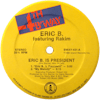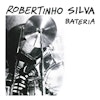Nineteen eighty-seven was a busy year for me. I was a member of a three-man dance squad called the Company Boys and we were in demand. Videos, TV shows, tours, photoshoots. We were young, and we were being paid to do what we loved: dance.
London’s underground clubs were surging, but our group was primarily birthed in the boogie scene. We were bleached-blonde boogie boys, raised on rare grooves, lovers rock, roots, electro, early house music, and the rapidly evolving sounds of hip-hop. After a whirlwind of a week in Tokyo (where we participated in a fashion show for Men’s Tenoras), we returned to England. The airplane’s wheels had barely touched the tarmac at Heathrow before I dropped my bags at home in Tottenham, North London, and then regrouped with my crew for a night out in South London. Our destination was Brixton.
The goal was to touch base with our favorite DJ, the legendary Paul “Trouble” Anderson (may he rest in peace), and decompress on the dance floor. The club (not far from Brixton tube station) was a small, black, basement with a banging sound system. Absolutely no one was there, except us, Paul, and the woman behind the bar.
We didn’t care. We came to dance. Period.
I cannot remember any particular song from that night, except one: “My Melody” by Eric B. & Rakim. Eric Barrier (also known as DJ Eric B.) and William Michael Griffin, Jr. (aka MC Rakim) came together on Long Island in 1986. “My Melody” was the third track on their debut album, Paid in Full, but was first released as the B-side of the “Eric B. Is President” 12-inch, an independent label release on Zakia that was soon picked up by Island Records subsidiary 4th & B'way. That night in Brixton was the first time I’d heard it.
It was the first time I’d heard anything like it.
The spaghetti-western whistle, the brain-clapping drums, the smooth, whistle-shadowing bass line, the abrasive scratching, and horn stabs. Combined, these simple elements formed a very catchy tune with continual momentum. There was less air between the beats—less space in their rhythm—compared to the artists that came before them. Their sound was further compressed by the dense and deep wordplay of the MC. I couldn’t be sure, but this rapper’s words sounded like poetry. Like jazz. Other emerging microphone legends such as KRS-One (of BDP) or Chuck D (of Public Enemy) delivered their lyrics via sledgehammer. Rakim favored a stiletto, a razor blade, or a katana. I found his sharp, clever, and precise wordplay nothing short of spectacular. I had to know what he was saying, exactly.
My boogie brethren seemed just as caught up in the moment as I. We asked Paul who the track was by and when he tried to cut to another song, we would plead, “Can you play ‘Check Out My Melody’ again?” After the third time, he was done with our request harassment, but by then I had memorized my favorite lyrics.
That section about taking seven MCs and putting them in a line...whoa. Definitely influenced by my youth and possibly influenced by my trip to Tokyo, I saw Rakim as a sword-wielding ronin, a masterless poet/samurai.
Indeed, the late-’80s rap scene in America very much resembled feudal Japan to me. New challengers were overthrowing the old order. BDP elevated the Bronx on “The Bridge Is Over” and directly derailed Queens original MC Shan, while Too Short’s pimping and NWA’s gangsterism confronted the notion of East Coast rap’s dominance.
LL Cool J subverted rap’s hard-hearted persona by releasing “I Need Love” and “I’m Bad” in the same year. Public Enemy took no prisoners and forced societal awareness onto the dance floor. When DJ Jazzy Jeff and the Fresh Prince’s commercial flavor broke ground in ’87, they were called clowns, but three short years later the Fresh Prince moved to Bel Air and achieved stardom on a celestial scale.
During this turbulent time, Eric B. & Rakim became the undisputed rap duo of their era. Even from a British basement in South London, it felt appropriate to pay homage to their ascension.


